When a pigeon develops an infected beak, it is essential to provide prompt treatment to alleviate discomfort and prevent further complications. Pigeons rely on their beaks for various activities, including feeding, grooming, and communication, making it crucial to address any infections promptly.
An infected beak in pigeons can result from injuries, bacterial or fungal infections, or underlying health issues. But how does one treat a pigeon’s infected beak? Recognizing the signs of infection and implementing appropriate treatment is vital for the bird’s well-being.
This article will discuss effective methods for treating a pigeon’s infected beak, including proper cleaning and disinfection, topical treatments, and seeking veterinary assistance when necessary.
By following these guidelines, pigeon owners and caretakers can help their feathered companions recover and regain their normal beak health, ensuring a happy and healthy life for these remarkable birds.
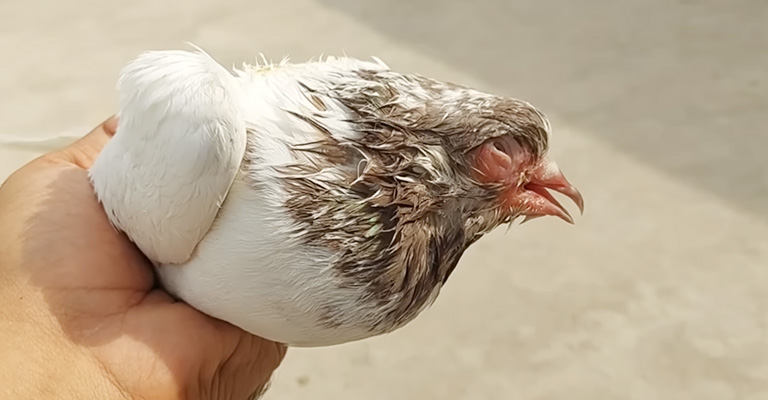
How Does One Treat a Pigeon’s Infected Beak?
When a pigeon develops an infected beak, it is crucial to provide prompt treatment to alleviate discomfort and prevent further complications. Let’s outline effective methods for treating a pigeon’s infected beak, including proper cleaning and disinfection, topical treatments, and seeking veterinary assistance when necessary.
Cleaning and Disinfection
Thoroughly clean the infected beak using a gentle antiseptic solution or warm saline water. Gently remove any debris or crusts that may have accumulated. Avoid causing further injury or discomfort to the bird while cleaning.
Topical Treatments
Apply a suitable topical treatment recommended by a veterinarian, such as an antibiotic or antifungal ointment, to the infected area. Follow the instructions provided by the veterinarian for proper application and frequency.
Pain Management
If the pigeon appears to be in pain or discomfort, consult a veterinarian for appropriate pain management options. They may recommend pain-relieving medications or suggest alternative methods to alleviate discomfort.
Nutritional Support
Ensure the pigeon receives a balanced diet rich in essential nutrients to support its overall health and immune system. Consult a veterinarian or avian specialist for specific dietary recommendations tailored to the pigeon’s needs.
Veterinary Assistance
If the infection persists, worsens, or if the pigeon shows signs of systemic illness, seek veterinary assistance promptly. A veterinarian can provide a comprehensive examination, diagnose underlying causes, and prescribe appropriate medications or treatments.
By following proper cleaning and disinfection protocols, applying topical treatments, managing pain, providing adequate nutrition, and seeking veterinary assistance when necessary, you can effectively treat a pigeon’s infected beak.
Prompt and appropriate care will help alleviate discomfort, prevent complications, and promote the bird’s overall well-being. Remember to consult a veterinarian for personalized advice and guidance throughout the treatment process.
What Causes Beak Infections and Injuries?
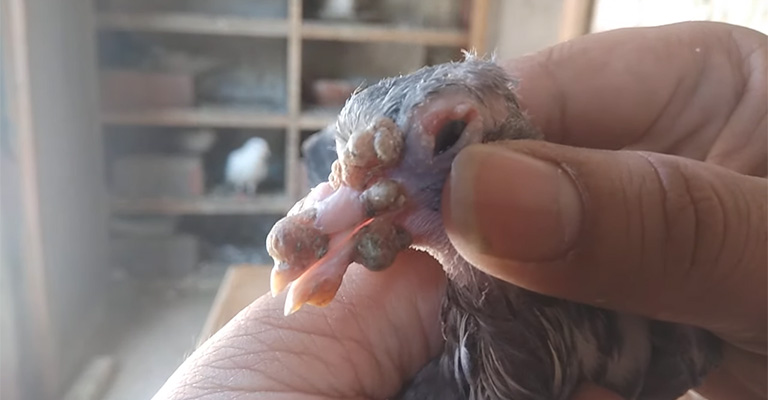
Beak infections and injuries in pigeons can be caused by various factors. Here are some common causes:
Trauma
Beak injuries can occur due to accidents, collisions, or fights with other birds. Trauma can lead to fractures, lacerations, or damage to the beak, creating an entry point for infections.
Bacterial or Fungal Infections
Pigeons can develop beak infections caused by bacteria or fungi. These microorganisms can enter through small cracks, wounds, or openings in the beak, leading to localized infections.
Nutritional Deficiencies
Poor nutrition, specifically a lack of essential vitamins and minerals, can weaken a pigeon’s immune system, making them more susceptible to infections.
Inadequate nutrition can also result in beak abnormalities, such as overgrowth or malformation, which can increase the risk of infections.
Parasitic Infestations
External parasites, such as mites or lice, can irritate and damage the skin around the beak, potentially leading to infections. These parasites can weaken the bird’s immune system and compromise the beak’s integrity.
Environmental Factors
Unhygienic living conditions, exposure to contaminated water sources, or contact with contaminated surfaces can introduce pathogens to the beak, increasing the risk of infections.
Underlying Health Issues
Pigeons with compromised immune systems or underlying health conditions, such as respiratory diseases or viral infections, may be more prone to beak infections.
Prompt identification of the underlying cause and appropriate treatment can help prevent and manage beak infections in pigeons effectively.
Consulting a veterinarian or avian specialist is recommended for accurate diagnosis and tailored treatment plans.
How to Diagnose an Abnormal or Infected Bird Beak?
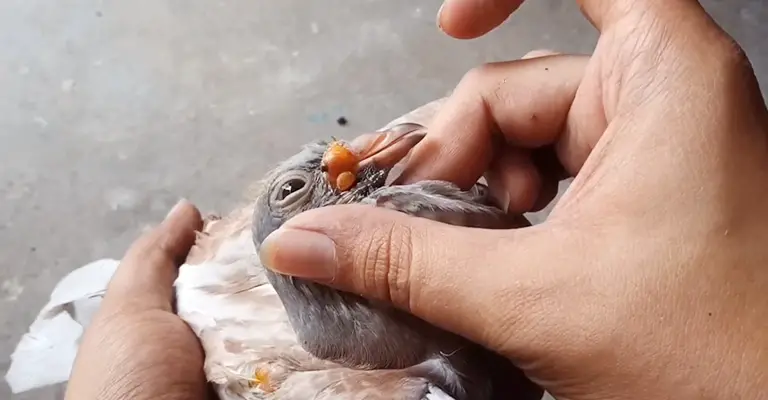
Diagnosing an abnormal or infected bird beak, including in pigeons, requires careful observation and, in some cases, veterinary expertise. Here are some steps to help diagnose an abnormal or infected bird beak:
Visual Examination
Begin by visually inspecting the bird’s beak for any visible abnormalities, such as cracks, swelling, discoloration, or signs of infection like discharge or crusts. Note any changes in the shape, size, or texture of the beak.
Behavior and Feeding Patterns
Observe the bird’s behavior and feeding patterns. A bird with an abnormal or infected beak may exhibit difficulties in eating, drinking, or preening. Changes in behavior, such as decreased appetite or increased irritability, can also indicate a problem.
Palpation
Gently palpate the beak to check for tenderness, pain, or any abnormalities that may not be immediately visible. Be cautious and avoid causing further discomfort or injury to the bird.
Veterinary Consultation
If you suspect an abnormal or infected beak, it is advisable to consult a veterinarian or avian specialist. They have the expertise to conduct a thorough examination, including using specialized tools and techniques, to diagnose the underlying cause accurately.
Diagnostic Tests
In some cases, the veterinarian may recommend additional diagnostic tests to further evaluate the beak condition.
These tests may include swabs or cultures to identify specific pathogens, blood tests to assess overall health and immune function, or imaging studies like X-rays to evaluate the underlying bone structure.
Remember, diagnosing an abnormal or infected bird beak can be challenging, and professional veterinary guidance is crucial for an accurate diagnosis.
Early detection and intervention can help prevent complications and ensure appropriate treatment for the bird’s well-being.
How to Prevent Beak Infection?
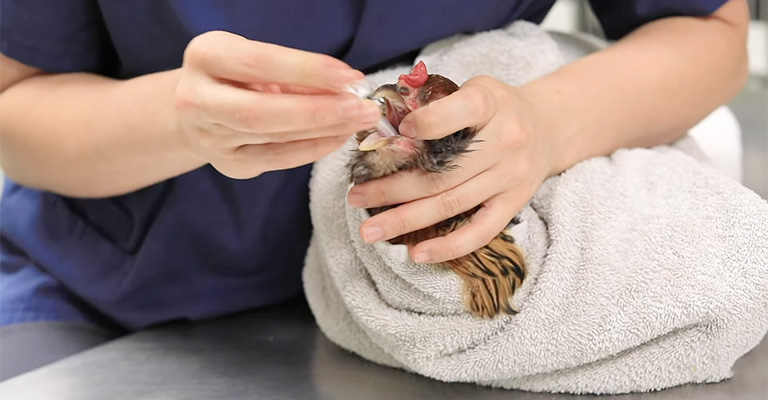
Preventing beak infections in pigeons and other birds involves implementing good hygiene practices and providing proper care. Here are some steps to help prevent beak infections:
Clean and Sanitize
Maintain a clean and hygienic environment for your pigeons. Regularly clean their living area, including perches, cages, and feeding dishes, to remove any accumulated dirt, droppings, or food debris that can harbor bacteria or fungi.
Provide Fresh Water
Ensure that your pigeons have access to clean and fresh water at all times. Regularly change the water to prevent contamination and the growth of harmful microorganisms.
Balanced Diet
Feed your pigeons a balanced and nutritious diet that meets their specific nutritional needs.
A well-rounded diet helps support their immune system and overall health, reducing the risk of infections. Consult a veterinarian or avian specialist for appropriate dietary recommendations.
Avoid Overcrowding
Overcrowding can increase stress levels and the spread of diseases among pigeons. Provide adequate space for each bird to minimize aggression and injuries that can lead to beak infections.
Regular Health Checks
Monitor your pigeons’ health regularly. Look for any signs of beak abnormalities, such as cracks, swelling, or discoloration. If you notice any changes or suspect an infection, seek veterinary advice promptly.
Quarantine New Birds
When introducing new pigeons to your flock, quarantine them for a period of time to ensure they are healthy and free from any contagious diseases. This helps prevent the introduction of infections to your existing birds.
Parasite Control
Implement a regular parasite control program to prevent external parasites, such as mites or lice, from infesting your pigeons. These parasites can cause irritation and damage to the beak, increasing the risk of infections.
Avoid Harmful Substances
Keep your pigeons away from toxic substances, including chemicals, pesticides, and plants that can be harmful if ingested or come into contact with the beak.
When to Take an Infected Pigeon to a Vet?
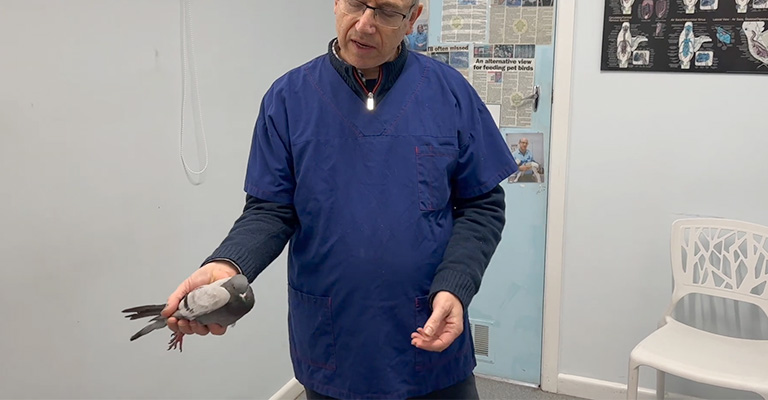
It is advisable to take an infected pigeon to a veterinarian or avian specialist as soon as you notice signs of infection or if the infection worsens despite home care. Here are some situations when it is recommended to seek veterinary assistance:
Severe Infection
If the infection in the pigeon’s beak is severe, with significant swelling, discharge, or spreading to other areas, it is crucial to consult a veterinarian.
Severe infections may require more aggressive treatment, such as oral antibiotics or surgical intervention.
Systemic Symptoms
If the infected pigeon shows signs of systemic illness, such as lethargy, loss of appetite, difficulty breathing, or abnormal behavior, it indicates that the infection may have spread beyond the beak.
These symptoms require immediate veterinary attention to assess the bird’s overall health and provide appropriate treatment.
Persistent Infection
If the infection does not improve or continues to worsen despite home care and treatment, it is essential to consult a veterinarian.
They can evaluate the effectiveness of the current treatment plan, identify any underlying causes, and adjust the treatment accordingly.
Recurring Infections
If the pigeon experiences recurrent beak infections, it may indicate an underlying health issue or predisposing factors that need to be addressed.
A veterinarian can conduct a thorough examination, perform diagnostic tests if necessary, and develop a long-term management plan to prevent future infections.
Expert Diagnosis
If you are unsure about the nature or severity of the infection, it is always best to consult a veterinarian for a professional diagnosis.
They have the expertise and tools to accurately assess the condition, identify the underlying cause, and provide appropriate treatment options.
FAQs
Can I treat a pigeon’s beak infection at home without veterinary assistance?
While some mild cases of beak infections in pigeons can be managed with proper home care, it is generally recommended to seek veterinary assistance for accurate diagnosis and appropriate treatment.
How long does it take for a pigeon’s beak infection to heal?
The healing time for a pigeon’s beak infection can vary depending on the severity of the infection, the effectiveness of the treatment, and the individual bird’s overall health.
Can beak infections in pigeons be contagious to other birds or humans?
Some beak infections in pigeons can be caused by contagious pathogens, such as bacteria or fungi. It is important to practice good hygiene and prevent direct contact between infected and healthy birds to minimize the risk of spreading the infection.
Can I use over-the-counter antibiotics to treat a pigeon’s beak infection?
Using over-the-counter antibiotics without veterinary guidance is not recommended. Different infections require specific antibiotics, and using the wrong medication or dosage can be ineffective or even harmful to the pigeon.
How can I prevent beak infections in my pigeon flock?
To prevent beak infections in pigeons, maintain a clean and hygienic environment, provide a balanced diet, avoid overcrowding, and monitor the birds’ health regularly.
Quarantine new birds before introducing them to the flock, and seek veterinary advice if you notice any signs of infection or abnormalities in the beaks of your pigeons.
Bottom Line
By taking proactive steps to treat a pigeon’s infected beak, you can significantly improve the bird’s quality of life and prevent the infection from worsening.
Remember to always handle pigeons with care and seek professional veterinary advice if the infection persists or worsens despite your efforts.
Regular monitoring of the bird’s beak health, maintaining a clean and hygienic environment, and providing a balanced diet can also contribute to preventing future infections. With proper treatment and ongoing care, your pigeon can recover and continue to thrive.
Mild infections may resolve within a couple of weeks with proper care, while more severe infections may require several weeks or longer to heal completely.
By being attentive to their needs and providing the necessary care, you can ensure that your feathered friend enjoys a healthy and happy life.